The point of a quality Santoku knife is to add a ton of functionality, maneuverability, and versatility to your kitchen. This is a Japanese-styled blade that follows the three virtues – cutting, slicing, and chopping. We at Knives Academy wanted to put this theory to test with the popular Mercer Culinary Genesis 7” Santoku Knife. It is our top choice for the best Santoku knife overall and provides you with all the flexibility you could want while making dishes from numerous cultures and traditions.
General Information – Mercer Culinary Genesis 7” Santoku Knife
Brand | Mercer Culinary |
Price Range | $40-$50 |
Manufacturing Country | Taiwan |
Total Knife Length (In/cm) | 13.50 / 34.29 |
Knife Weight (Oz/Gr) | 3.20 / 90.72 |
Mercer Culinary (or the Mercer Tool Corp. as it was originally known) has been around since 1968, providing high-quality products for decades. This is a second-generation family business headquartered in New York that ships worldwide to professional chefs and amateur consumers alike. The 7” Santoku is one of their premier products because of its versatility.
Even though this blade is meant for beginners, the exceptionally high value of what you get for the price should put it more in the range of chef-level equipment. You typically want a Santoku knife to offer durability and agility with the movements of cooking, and this blade does the trick well enough for first-time cooks to be comfortable.
At a total length of 13.50” and weight of only 3.20oz, it does not feel bulky or cumbersome to use. That places less stress on the wrist while providing enough space to work with meats, vegetables, and other ingredients.
Mercer Culinary Genesis 7” Santoku Knife Unboxing
Unlike many other companies that overspend on the packaging and aesthetics of how your knife arrives, Mercer emphasizes blade quality. Of course, it still guards the knife in the packaging so you will not cut yourself from the sharp edge, but don’t expect the red carpet when the Santoku knife arrives at your home.
That said, you will feel a sense of immediate premium materials when you pick up the handle for the first time.
The Blade of the Mercer Culinary Genesis 7” Santoku Knife
Forged / stamped | Forged |
Blade Material | High carbon forged steel from Solingen, Germany |
Blade Flexibility | Slightly flexible |
Blade Edge | Hollow bevel |
Straight/Serrated | Straight |
Blade angle | 15° |
Balance | Well balanced |
Blade Length (Inches) | 7 |
Blade Height (Inches) | 0.945 |
Blade thickness/width (inches) | 0.2 |
HRC (Rockwell Hardness) | 56 +/- 1 |
Now for the most essential part of our review – the blade. You get plenty of durability with an HRC rating of 56 or so, which is more than enough for most kitchens. We were able to work with most of the ingredients we tried, except for bone and tough vegetables.
One of the better features of this Santoku knife is the hollow edge. That makes it sharper than others in the price range and also means the food sticks less to the sides. That is a huge help when you’re working with thick meats, fish, or sticky vegetables like squash. You may feel the blade is more fragile because of the hollowness, but with a bit of extra care, you can easily avoid chipping or damage.
You will need to apply more effort when cutting through thicker ingredients. This is because the lighter weight of the knife means more force, but it should be more than comfortable enough for most home cooks. That is part of why it is such a great beginner’s choice and because the angle is only 15 degrees, which is not the sharpest, but plenty to work with for at-home use.
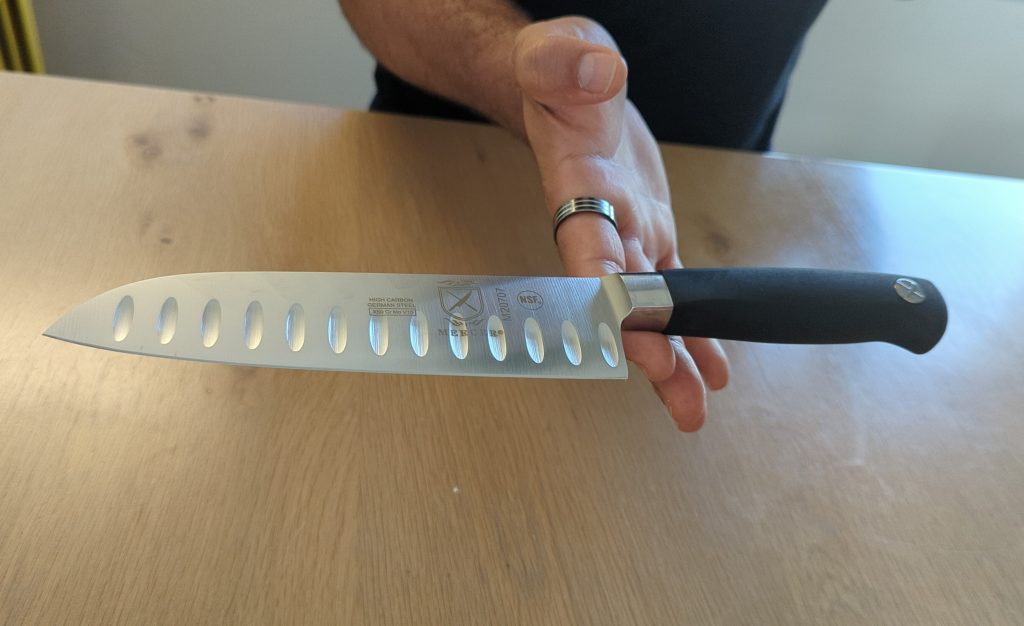
The Handle of the Mercer Culinary Genesis 7-Inch Santoku Knife
Handle Length (Inches) | 5 |
Handle Feel | Great comfort and safe grip |
Tang | Full Tang |
Handle Material | Santoprene |
Handle Color | Black |
The makeup of a knife handle is critical to your daily use, especially if you are new to Santoku blades. This is a reasonably sharp knife with a lot of versatility, and you want a handle that will not slip out of your hands or suddenly change angles on you when working in the kitchen.
The Mercer Culinary Genesis has a non-slip grip, even when you have leftover water or oil on your hands. While some professional chefs do not like the feel of Santoprene, we think this is an excellent option for beginners who have not spent years building the agility and blade awareness as chefs working in a restaurant setting.
Mercer did a great job of making the handle an ideal size for cooks with either big or small hands. It is comfortable and does not feel awkward while slicing, cutting, or dicing. That is critical because this is a full tang blade, which means you will feel the weight toward the handle a little bit. Luckily the bolster on this blade is pronounced enough to get a solid grip for different cutting techniques.
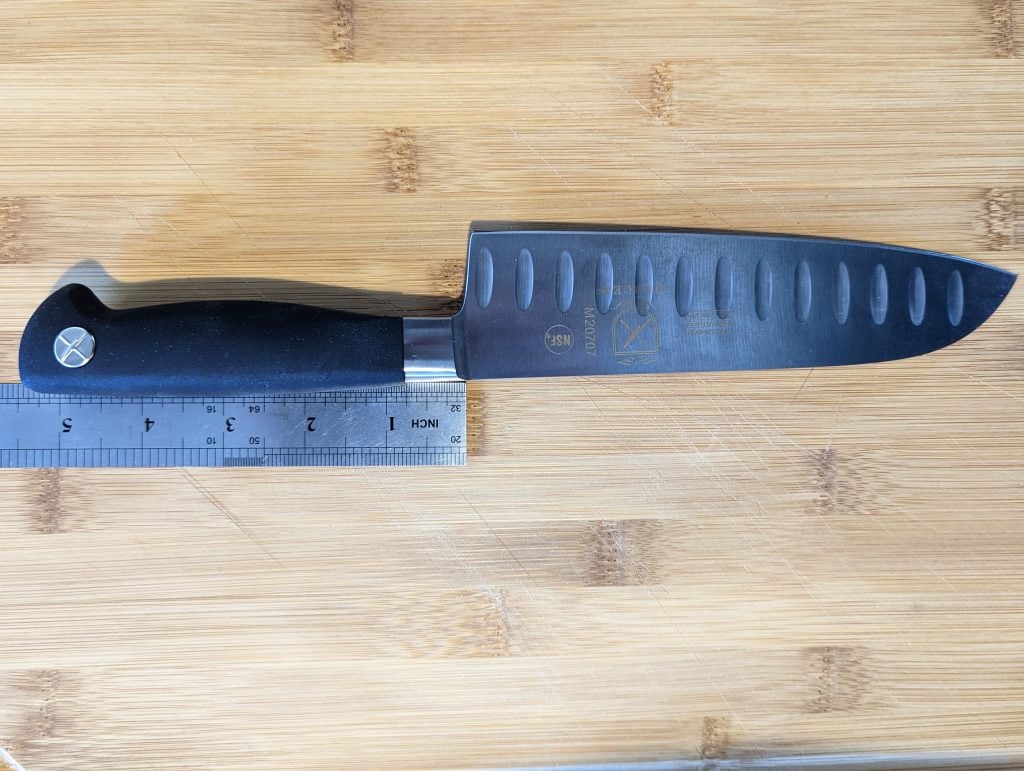
Uses of the Mercer Culinary Genesis 7-Inch Santoku Knife
This blade meets the perfect definition of a Santoku knife. We call this an all-rounder because it is one of those tools you can always have on you to do most kitchen prep and cooking tasks. We were easily able to manage cooking goals like:
- Slicing and chopping vegetables
- Chopping herbs
- Smashing or crushing garlic
- Slicing raw meat
We should point out that the raw meat was not perfect, but again the hollow edge helped with the ingredients not sticking to the sides and worked well enough for most home cooks.
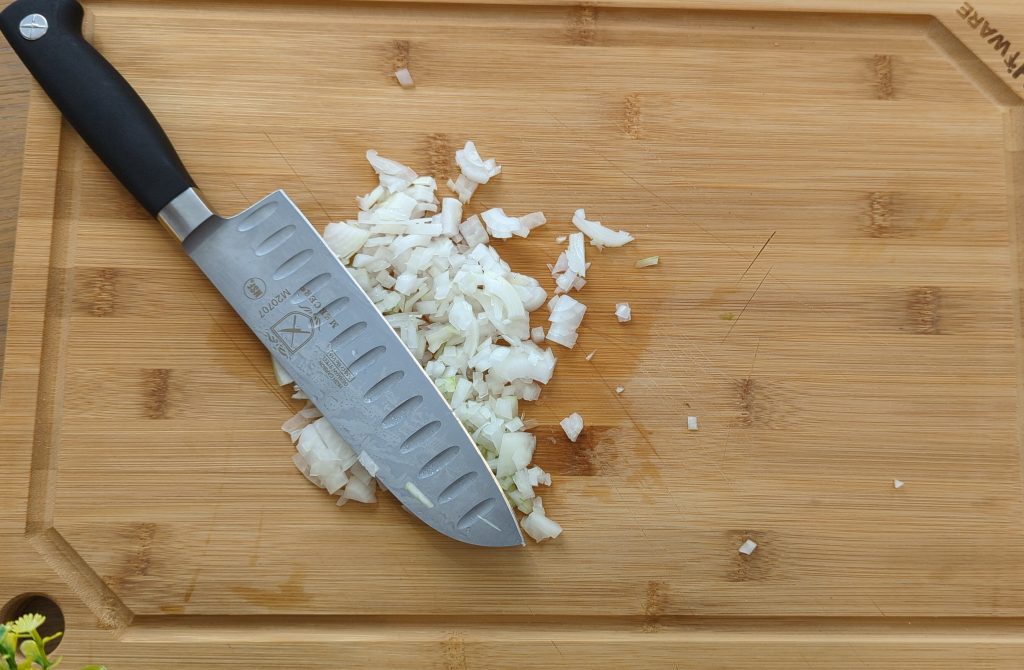
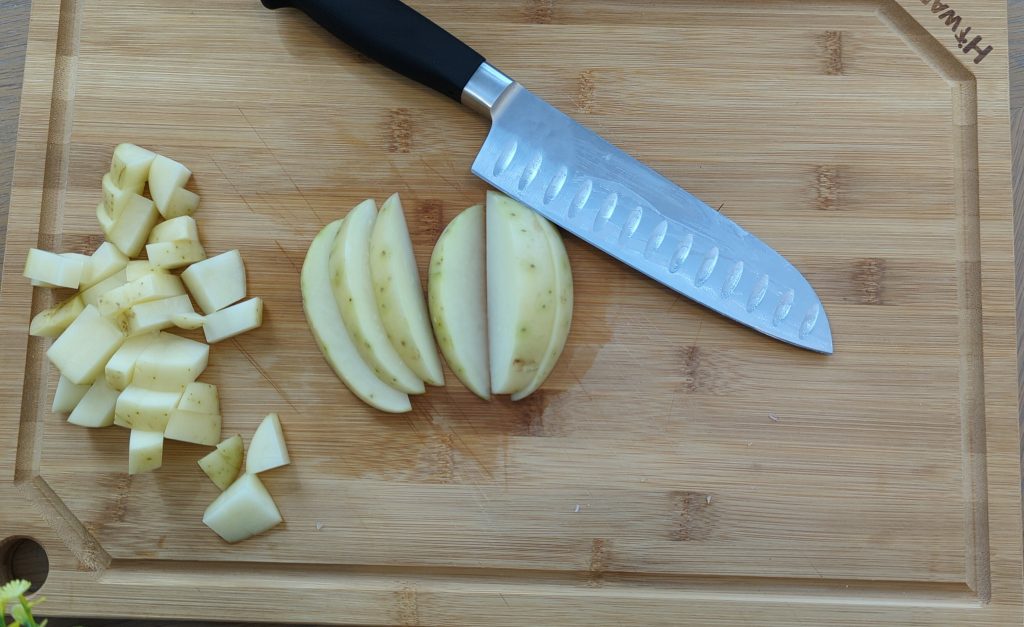
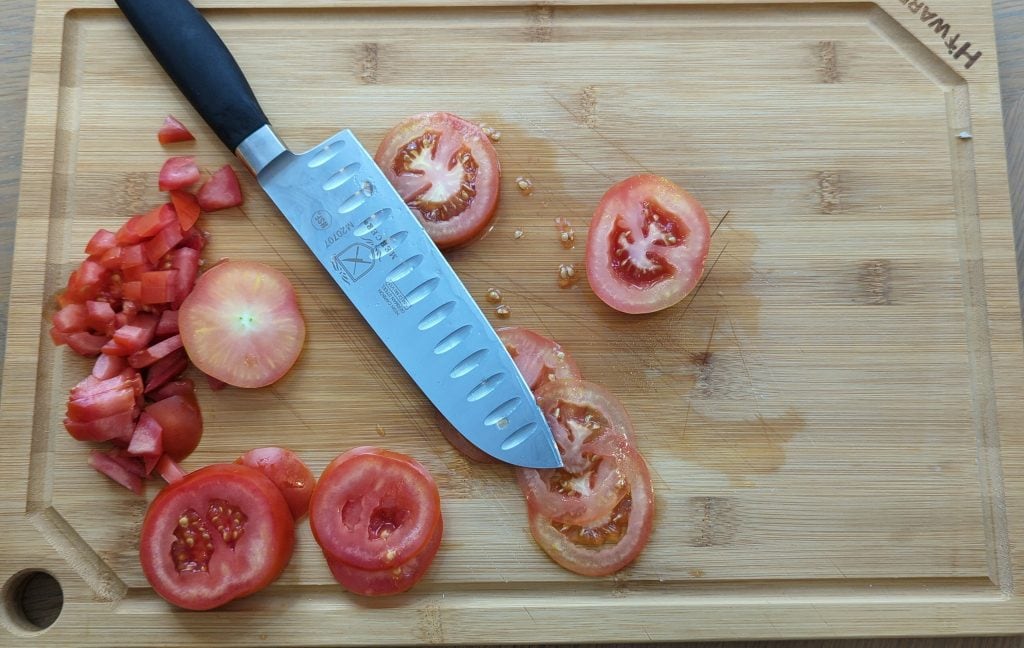
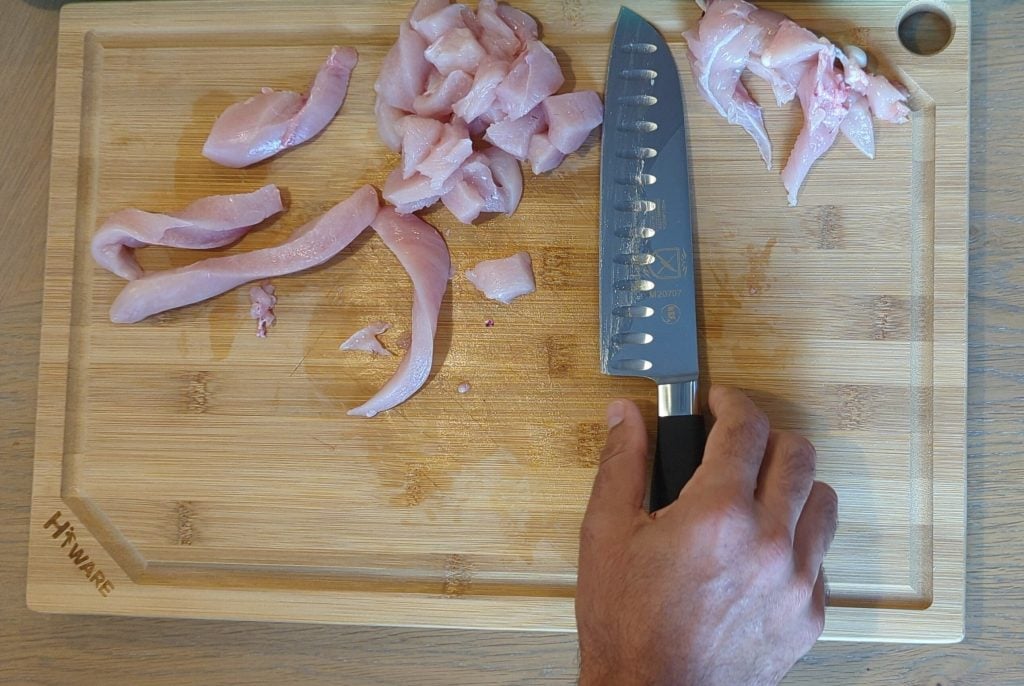
Some of the tasks that did not go as well as we would have liked during our Santoku knife review were:
- Cutting big and hard vegetables
- Filleting
- Delicate tasks and peeling
- Definitely not for breaking bones
We should point out that this is not a fillet knife. We could do it well for a full salmon cut, but you do not get the precision because the blade is not narrow or as flexible as a traditional fillet knife. It is also a bit too big for delicate tasks you would prefer a paring knife for, like peeling an apple.
Read now >> Santoku vs Nakiri knife
Maintenance and Cleaning
This Santoku knife is a perfect starting point for beginners to learn how to maintain the sharpness of a blade. This knife has a hollow edge, so you should stick to honing more than sharpening. That way, you are not removing metal.
We had no problem resharpening this Santoku knife using a metal honing steel and a ceramic sharpener. If you have a diamond honing steel, that would be the best.
As for keeping the blade clean, do not place this knife into a dishwasher. You will see the edge get duller, and the blade develops spots from too much hot water damage. Instead, stick to a mild soap that you handwash on the sides and then rinse and dry thoroughly before replacing in a block or storing safely away.
Be sure to avoid putting this blade in aluminum pans or stainless steel sinks for a prolonged time, as you do not want any pitting from the transfer of electrons from one metal to another.
Conclusion
All in all, this is the best Santoku knife we have found on the current market. It offers many benefits with a price point that seems low for so much quality. We highly recommend the Mercer Culinary Genesis 7” Santoku Knife to beginners and even some professionals because you get so much versatility and reliability.
This is one of the staple pieces we would want to have when walking into a new kitchen or setting up a space for cooking at home. Pick up one of these useful Santoku knives today, and you will see the excellent all-rounder possibilities in your kitchen.

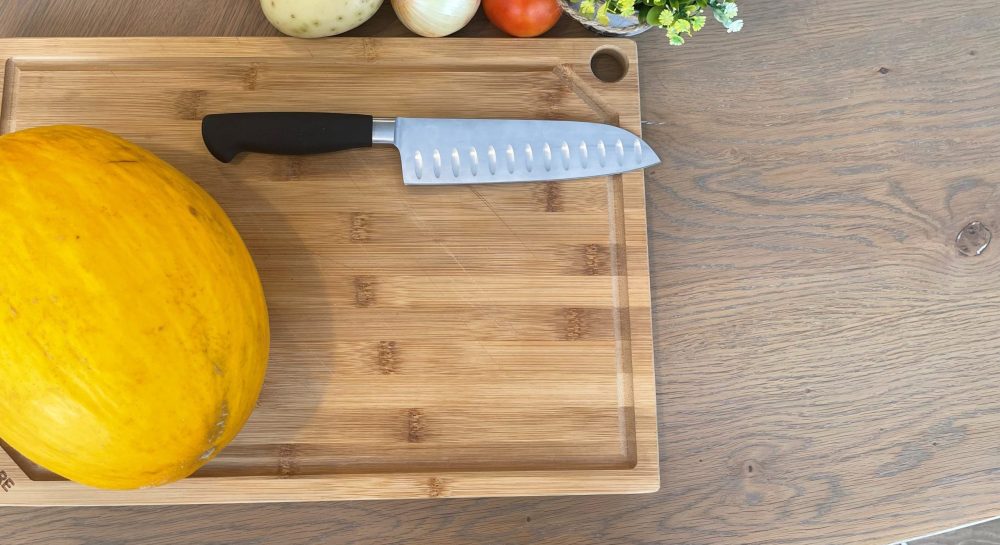


Post Your Thoughts